GRIT, confidence, ambition and success. It takes a lot to stand out from the pack in Queensland’s crowded business scene. Everyone included in this year’s Top 20 Under 40 list has done just that. It’s the fourth year QBM has devoted an issue to profiling some of the most inspiring and innovative young entrepreneurs and business leaders in the state.
They all have remarkable stories and some you may not have heard about before.
One of the biggest home-grown success stories on the list is the quartet behind Brisbane payroll automation firm Tanda.
Josh Cameron, Tasmin Trezise, Alex Ghiculescu and Jake Phillpot developed Tanda’s technology as QUT students back in 2012.
Today it employs 140 people and boasts some of Australia’s largest companies as clients.
It is a company veteran entrepreneurial talent spotter Steve Baxter - of Shark Tank Australia fame - would love to invest in. “These guys haven’t taken a single investment cent - they have done it all off their own bat,” says a clearly impressed Baxter, who will wind up his year as Queensland Chief Entrepreneur next month. “They have a youthful arrogance that I love”.
Jasmin Robertson, whose food manufacturer Roza’s Gourmet employs more than 50 people, has also wowed Baxter.
“Jas is fantastic,” Baxter enthuses. “She is one of the gems of Queensland. She is awsome.
“She is a CEO who works in the business ... she does a lot of networking and gives her time so freely to people who ask,” he says. “But I think she’d be a devastating business person to compete against ... she’s a bit like a smiling assassin.”
The list, which isn’t ranked, celebrates a new batch of high achievers in their fields every year.
This year it includes entrepreneurs, innovators, corporate executives, manufacturers, retailers, lawyers, restaurateurs and engineers.
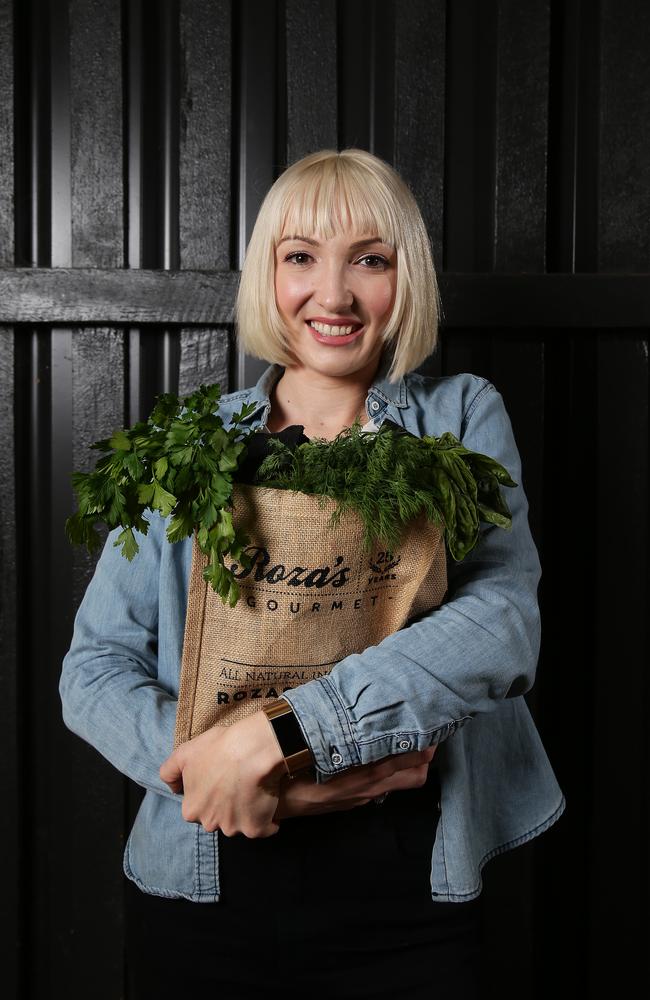
JASMIN ROBERTSON (31)
Director of Roza’s Gourmet
WHEN Jasmin Robertson took over her family’s small sauce company at age 24 she didn’t feel right about calling herself a CEO.
Given that under her guidance as director and owner, Roza’s Gourmet is now set to crack turnover of $8 million or more this year, she need not have worried.
Officially taking on the business – started 27 years ago when her mum Roza sold homemade sauces at markets and from the driveway in western Brisbane – came about in 2011. Her mother had passed away a decade earlier and her father Bill wanted to retire so Robertson’s involvement was initially designed as a short-term plan to build up the business enough to sell.
Revitalisation started with going back to the original labels and a discussion with her dad about the need to put barcodes on bottles. Since then Robertson has overseen growth of 40-60 per cent year on year and even more this year. Her plan for a quick exit has also changed.
“I always came into the business with the objective of selling it but now that it has become mine I take it really personally so it’s hard to say (if I would sell now),” she says.
Between sourcing masses of basil needed for her trademark pestos Robertson is also the face of the brand, flying around the country to trade shows and entrepreneur speaking events as well as pushing the next wave of products to expand while juggling cash flow and factory capacity demands.
Robertson is also in charge of 50 staff both administrative and at the factory in Brisbane where tens of thousands of products are made every week. There are more than 50 different varieties of mustards, dips, chilli sauces made to her mother’s original natural mantra – think free-range egg mayo and sauces sweetened with bush honey. Now she’s taking on the cracker market with her own brand of gluten free crackers.
“It’s a little bit like a constant state of panic but in a good way,” she says. “We are very proud of what we are doing.
“This year we have had growth of 75 per cent so it’s just constantly changing and people who have worked with us for a while are doing new roles.
“We still have lots of opportunities for growth in Australia in terms of existing stockists and new ones as well.”
Roza’s products are in more than 800 stores across the country. It also recently expanded with direct sales into Western Australia and is selling through select retailers in Asia.
“We will never sell into the majors (supermarkets) because that was not mum’s philosophy. She was always about supporting small business,” Robertson says.
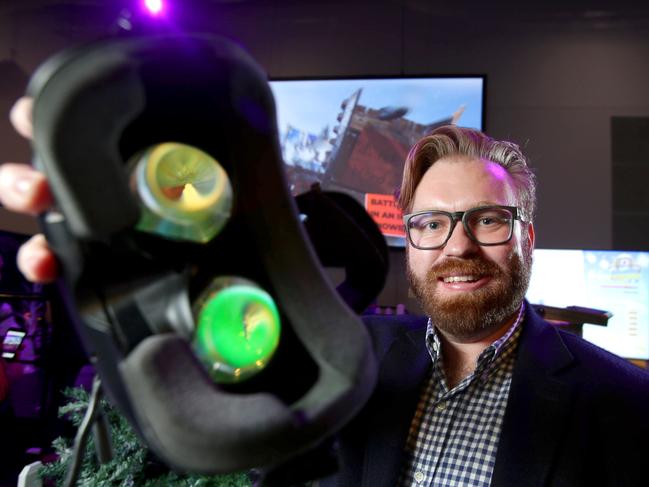
SAM HUSSEY (31)
Lightweave co-founder
AS A 13-year-old Sam Hussey sold ice creams to raise money to buy camera equipment for his own filmmaking business.
“I sold enough Streets ice cream to buy a camera and then started making surfing films,” says Hussey, who is now managing director of Brisbane-based virtual reality company Lightweave.
“I have always liked storytelling and creating visual images.”
In 2016, Hussey (above) and his business partners formed Lightweave, which specialises in augmented reality games, marketing and events.
“This is an industry that is changing so rapidly,” Hussey says, and Lightweave is now moving into international markets, recently opening an office in Singapore.
He said further expansion into Asia, North America and the UK is on the cards as Lightweave rolls out a new augmented reality app called District.
“District is like a cross between Pokemon and the Greatest Race,” Hussey says. “People download the app on their phone and have a set time to do a number of challenges and also go through certain checkpoints.”
District challenges have been launched in Singapore and Hong Kong and attracted major sponsors such as Adidas.
Hussey is soon off to London to take part in the Virgin Start Up Step Up program organised through his alma mater, QUT. He will meet Virgin founder Sir Richard Branson and hopefully attract some investment from the UK.
“Lightweave has grown even though we have had no investment,” he says. “In the next five years we hope to continue to grow, make virtual reality more accessible and also create that bit of magic for our users.”
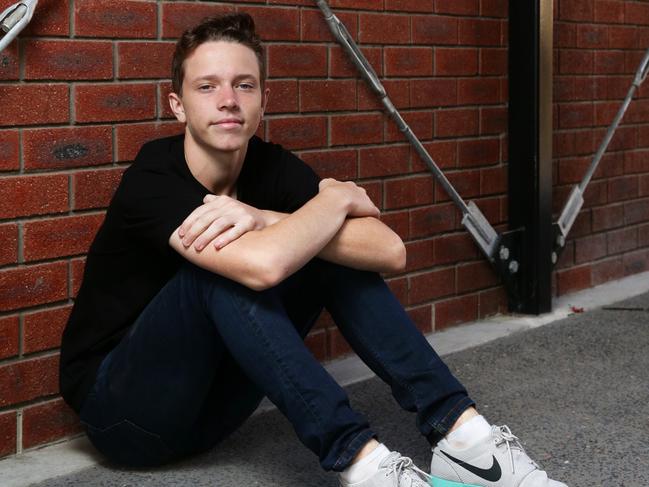
TOM STOLBERG (15)
Make It Now founder
There is a sense of urgency to Tom Stolberg’s budding career.
It’s echoed in the name of his latest startup, Make It Now. The Mackay schoolboy (below) recently out-pitched older rivals to win Advance Queensland’s Young Starters’ Competition with his venture, which uses recycled plastics for large scale 3D printing.
“It’s basically building ideas,” says Stolberg, of the company’s goal. His first commission is to create a rapid prototyping and hacking space at Mackay’s innovation hub Split Spaces. Stolberg, who flew to the US earlier this year as part of the State Government-backed Myriad Festival, cut his entrepreneurial teeth as a 12-year old with Boaties Bait, which upcycled restaurant waste to local fishermen.
After selling 2½ tonnes of bait over a couple of years he recently closed the business. “Cuttlefish wasn’t my passion,” he says. Instead he wants to grow Make It Now and pursue other entrepreneurial dreams. “What appeals to me is the ability to be my own boss and also to do something different and inspire others.”
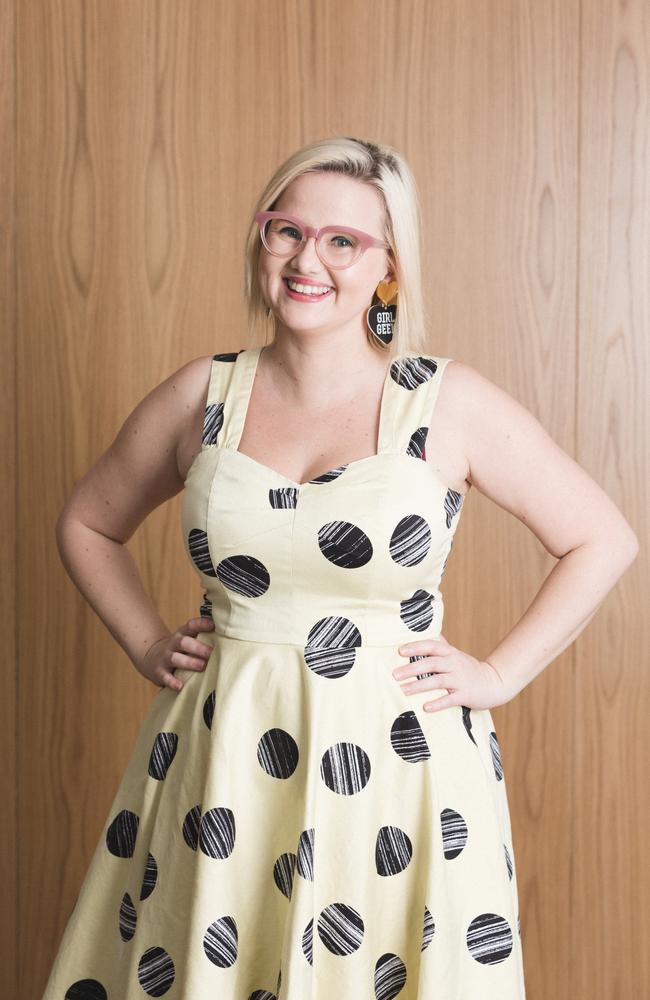
SARAH MORAN(34)
Girl Geek Academy CEO and co-founder
Proud “massive girl geek”, Sarah Moran (below) has always had a passion for technology. But while in high school, a discouraging teacher led her to choose not to go down that path – initially, at least. Now as chief executive and co-founder of Girl Geek Academy, Moran is on a mission to ensure no other young girl feels afraid to explore their potential, and to teach one million women around the globe about technology by 2025.
Since being launched in 2014, the Girl Geek Academy has introduced thousands of young girls through numerous coding, hacking and gaming workshops.
“More women creating the internet, more women in the room when decisions are made, more women owning the companies that we use every day, will lead to gender equality in the space that we all live and play in,” she says. Moran’s next big project is to launch a new portal where female tech experts can share their skills across the country. “We’re building a platform to scale up our work, and will be doing a massive call out for girl geeks across the country to speak or run a workshop, where they are needed.”
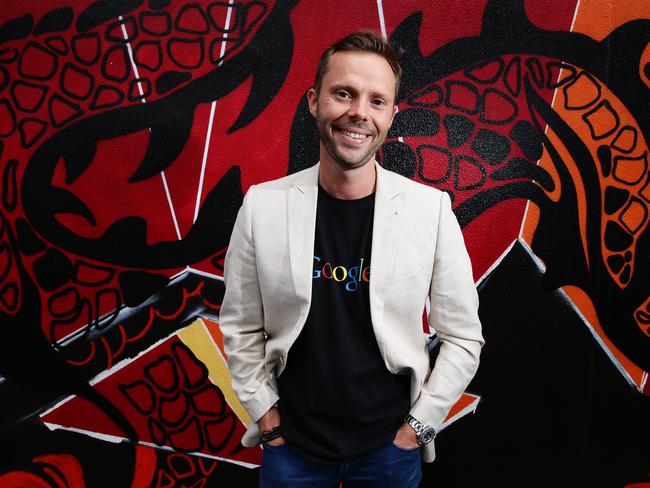
BEN BRADSHAW (35)
SponsoredLinX CEO and co-founder
It is no understatement that SponsoredLinX co-founder and chief executive Ben Bradshaw is a man of many talents.
Before building up his company into one of the leading players in the digital marketing field in the country, he had an extensive career as a magician doing corporate gigs, and is even a multiple Guinness World Record Holder (for the fastest time to escape from a straitjacket on land and underwater, no less).
These days Bradshaw (above) is spending more time on the magic of growing his company. Since launching in 2006 the business, with more than 170 employees, has hit multiple milestones, including a client base of more than 4000 and revenue surging to about $20 million. The latest project for Bradshaw is setting up for the next chapter, and moving into a state-of-the art “Google-style” office in Brisbane later this year.
“There will be space for 250 people, a 90-seat auditorium, it’s completely geared for our next big stage of growth. We’ve taken the last 12 years of being in business and really imagined how a digital marketing office should ideally be, and built it,” he says.
The company, which regularly achieves 30 per cent annual growth, about double the industry average, was co-founded with his partner Shannah.
“Even though it is a family business, we treat it like a professionally run sports team,” he says.
“We basically operate between two speeds – fast and furious. We want to be the place where, when people leave university, they want to come here.
“We are really excited about taking our company culture to the next level. We’re one of the biggest employers of digital marketers in Australia, and we’re really proud to be able to do that from Brisbane.”

DOMINIQUE LAMB (33)
National Retail Association CEO
As a self-described “child of retail”, Dominique Lamb’s passion for the rapidly evolving sector is clearly evident.
Raised by a single mother who herself forged a retail career, Lamb (above) spent much of her formative years in stockrooms, later handing out flyers or spending time with her grandparents who ran a fish and chip shop. After studying law and arts, she completed a masters in employment relations, and later worked in private practice as an employment lawyer.
Lamb had been employed by NRA as the director of its legal division when she was urged by the board to take over the role previously held by Trevor Evans, following his election as the federal member for Brisbane.
She has now been the chief executive of the National Retail Association, a body representing thousands of retailers across the country, since 2016.
“I refer to myself as the accidental CEO,” she says.
“The reality is I spent my whole life building a legal career, but I really enjoyed being on the front line and understanding people’s businesses, I find it fascinating.
“I had a board who was very supportive of diversity and they approached me based on my skills and experience, and told me they thought I would be a great fit.”
A typical week for Lamb is varied to say the least, from meeting with government officials about an issue plaguing retailers, to dealing with legal policies.
It can be fronting the cameras or radio microphones, or travelling interstate for meetings with stakeholders and members.
As well as fighting for change and the rights of retailers, Lamb is a passionate advocate for gender diversity and women’s rights.
For more than eight years she has volunteered for the Women’s Legal Service Queensland and serves on its board, and is the chair of Dancing CEOs, which raised $265,000 for the legal service earlier this year.
She credits her grandmother as being one of her role models.
“She really instilled in me the concept that you never stand by and just let something bad happen, and not say anything, and that there was nothing that I couldn’t do,” she says.
Lamb is expecting her first child, a daughter, with husband Anthony Kuhlmann in October.
She says she is committed to continuing to fight for the rights of retailers, and to enact positive change.
“For me, I think I’ve got a lot more work to do,” she says.
“The fact is we genuinely are able to advocate for change for the better for businesses – there are very few roles that offer that, and it’s a great platform to be able to make social change as well.
“I’ve learnt that I am comfortable making hard decisions when I need to, and taking the people I work with on a journey.
“The more you learn about retailers the more you realise what lovely people they are to be around, and I’m certainly not done yet.”
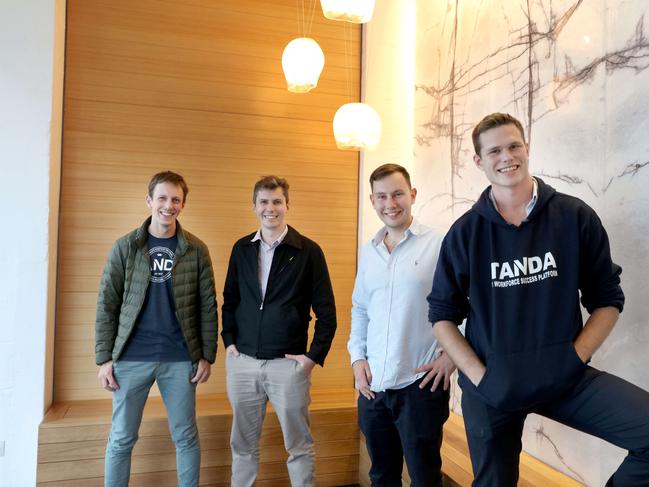
ALEX GHICULESCU (26), JOSH CAMERON (29), JAKE PHILLPOT (26), TASMIN TREZISE (25)
Tanda co-founders
Four mates at the QUT were working on a problem in 2012 – their student bar was losing money, and paperwork for staff was causing headaches.
So Alex Ghiculescu, Josh Cameron, Jake Phillpot and Tasmin Trezise (left to right above) worked together to form a way to automate payroll processes. Each of the founders had different study specialties – finance, information technology, law and accounting – and their idea has since blossomed into a growing Brisbane company called Tanda (the short version of time and attendance).
Their technology aims at shift-style work. It helps in areas such as clocking on and off via touchpads, automatically sending rosters via email or text messages to staff, or automatically calculating award rates. “People (realise) how difficult it is to pay people in Australia,” Trezise says.
The latest version, just released, displays real-time evaluation of wages versus income. Now their system is used to cover 100,000 staff, by Tanda’s estimates. That’s almost double a year earlier.
Their software is used by companies including The Cheesecake Shop, hardware outfit Bunnings Warehouse and pizza chain Domino’s.
Domino’s tells QBM that Tanda’s rostering system uses machine learning to build and analyse rosters, which helps franchise operators ensure maximum productivity of one of their store’s largest costs, which is labour.
Further, because the system is based on cloud-computing, owners with more than one store can review management data across multiple stores in real time, Domino’s says.
The goal for Tanda now is expanding internationally. Two key markets are the UK and US. “We’ve got to keep growing,” Trezise says. Despite running for several years and picking up big name companies, Tanda so far has not raised capital – the four still own one share each.
“You’re always in survival mode,” Trezise says. “If you’re in survival mode, you do what you need to get to that next stage.”
Now the company employs roughly 140 staff. The vibe is fairly young in the main office, crunched between Brisbane’s CBD and the more hip Fortitude Valley, although the company’s advisor is Queensland IT veteran John Puttick.
Bells hang from cords in the office to announce sales, staff dress casually and there’s a live-camera feed to their office in the Philippines.
The company declines to detail financial performance. They are not ruling out a stockmarket float or partnering down the track, but Trezise says there are no immediate plans.
“It’s got to be people with the same long-term vision,” he says.
He argues the vision of the company is to assist others make their staffing better. “We help business do that with their teams,” Trezise says.
Compare that to their university days, where the shift system used Excel software and paperwork. “People just hated engaging that way.”
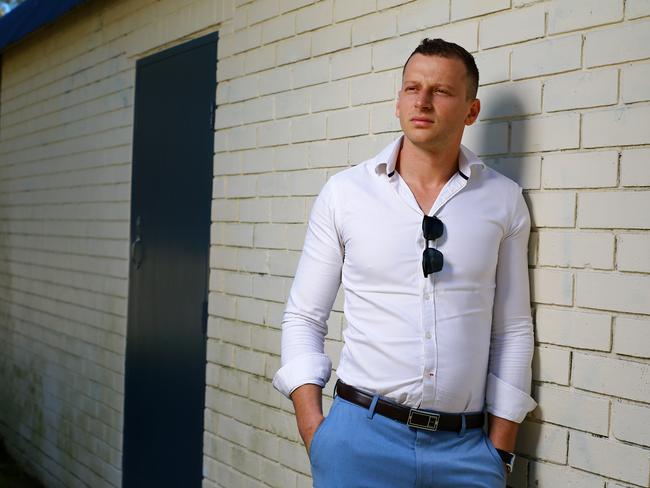
STEPHEN BORNSTEIN (29)
Cyborg Dynamics Engineering founder
Lego was one of the signs that a young Stephen Bornstein would get into engineering, a career that has taken him to work on missile defences, flight simulators and anti-poaching projects.
As the current winner of Engineers Australia’s young professional engineer award, Bornstein says the innovation side of his profession got him hooked.
“I just like producing stuff – the creativity aspect,” he says.
He traces that interest back to building things with Lego as a three-year-old, graduating to its more difficult Technic version and later coding his graphics calculator to solve maths problems in high school.
Based in Brisbane since 2016, Bornstein (above) has founded Cyborg Dynamics Engineering and also worked as an engineer at Rocket Lab, BAE Systems and Airbus. Jobs ranged from assisting on missile decoy projects to helping design a prototype drone for anti-poaching activities in Africa.
Engineers Australia told QBM that Bornstein had won the award for factors including his “outstanding capacity for resourceful and innovative work” along with using his engineering skills to assist community projects, such as helping create a cockpit flight simulator for the Royal Flying Doctor Service that kids can play with. It needed to be “ruggedised” to cope with the children’s rough play, Bornstein says. He says Australia can do more as an engineering nation.
“We’re underutilising the Australian workforce. We’re not doing enough high-tech stuff in Australia,” Bornstein says.
An attraction for working here, he says, is the lifestyle, plus there’s a pool of skilled graduates from local universities.
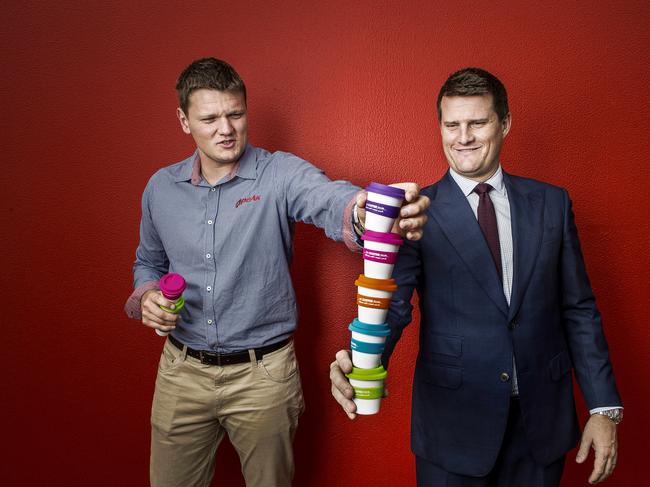
SAM HARDY (34), HAMISH ELLINGHAM (25)
Peak Marketing co-founders
Sam Hardy and business partner Hamish Ellingham know China like the back of their hands.
As directors of Brisbane-based Peak Marketing, the two men scour the mainland looking for marketing merchandise – anything from coffee cups to skateboards – for their clients that include Coffee Club, Domino’s, Darrell Lea and Unilever.
“Just last week, Hamish (below left) was in China looking for 500 pinball machines that will be a gift-for-purchase item for one of our clients,” says Hardy (below right).
Peak Marketing was formed from the ashes of the company Hardy’s parents established in the 1980s at Brendale. It later hit hard times under new ownership and was bought back by the family.
After completing a finance degree at QUT, Hardy worked as a currency trader in Canada before returning to Australia in 2009 to found Peak with friend Ellingham.
Ellingham handles the day-to-day operations and according to Hardy is the “oldest 25-year-old you will ever meet”. Peak has set up an office in Ningbo, China, to source materials for customers.
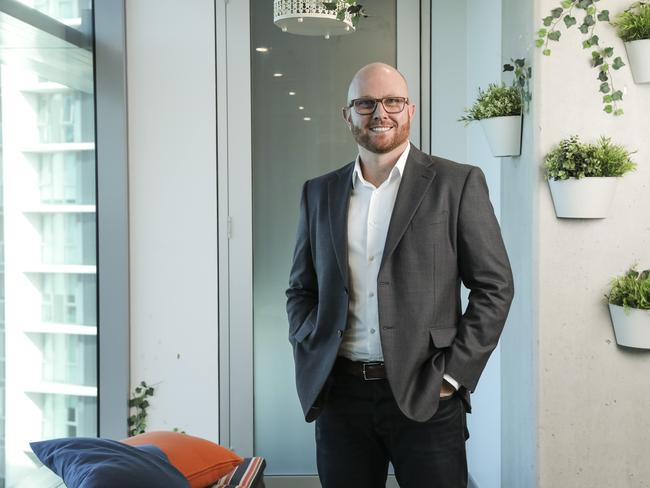
NICK KNIGHT (35)
Domino’s Pizza Aust/NZ CEO
Knight’s is a quintessential success story – from waving promo boards for Domino’s as a 13-year-old in his home town, to heading the pizza chain in Australia and New Zealand. He left the company after school for two years but returned to Domino’s helping franchisees set up shop. He also built a huge portfolio of them for himself.
As Domino’s Australia/New Zealand CEO Knight (below) now owns over $3.4 million in shares and took home $400,000 in pay and perks, according to the 2018 annual report.
He says it’s a company that celebrates youth and new ideas. “At Domino’s it’s easy. I don’t think as an executive in other publicly-listed companies, certainly of this size, I would survive and they probably wouldn’t like me either but that’s OK.”
“Australia is the most developed market. We are the petri dish for global strategy. We get to test and learn new things that then make their way to other parts of the world.”
When not in the office or his Teneriffe unit, Knight escapes to his Sunshine Coast hinterland property where he loves dirt bike racing and smoking meats.

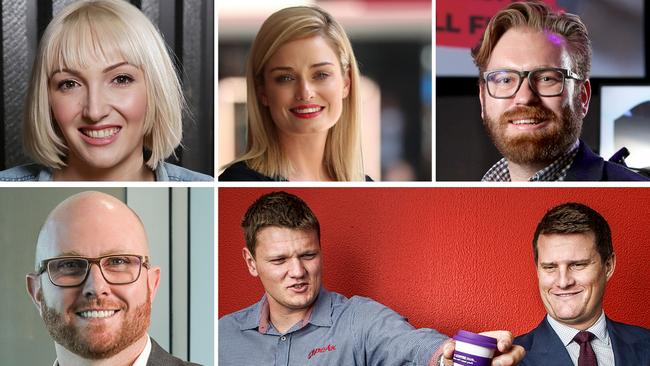
Add your comment to this story
To join the conversation, please log in. Don't have an account? Register
Join the conversation, you are commenting as Logout
Stealing clients on the rise
In the modern marketplace, rampant exposure and access to other opportunities prevents the majority of workers from staying in the same job for an extended period leading to some big issues
Our hidden exporting powerhouse
A quick look at the figures shows Queensland’s pharmaceutical exports sector has been a standout, pumping millions into the economy